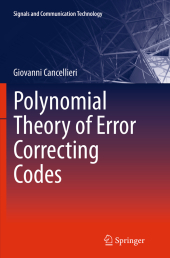 Neuerscheinungen 2016Stand: 2020-02-01 |
Schnellsuche
ISBN/Stichwort/Autor
|
Herderstraße 10
10625 Berlin
Tel.: 030 315 714 16
Fax 030 315 714 14
info@buchspektrum.de |

Giovanni Cancellieri
Polynomial Theory of Error Correcting Codes
Softcover reprint of the original 1st ed. 2015. 2016. xviii, 732 S. 320 SW-Abb. 235 mm
Verlag/Jahr: SPRINGER, BERLIN; SPRINGER INTERNATIONAL PUBLISHING 2016
ISBN: 3-319-37870-8 (3319378708)
Neue ISBN: 978-3-319-37870-1 (9783319378701)
Preis und Lieferzeit: Bitte klicken
Numerous examples and indexed definitions make this detailed guide to polynomial theory in error-correcting codes a highly accessible resource. New codes and a unitary approach to block and convolutional codes will enhance readers´ understanding of the topic.
The book offers an original view on channel coding, based on a unitary approach to block and convolutional codes for error correction. It presents both new concepts and new families of codes. For example, lengthened and modified lengthened cyclic codes are introduced as a bridge towards time-invariant convolutional codes and their extension to time-varying versions. The novel families of codes include turbo codes and low-density parity check (LDPC) codes, the features of which are justified from the structural properties of the component codes. Design procedures for regular LDPC codes are proposed, supported by the presented theory. Quasi-cyclic LDPC codes, in block or convolutional form, represent one of the most original contributions of the book. The use of more than 100 examples allows the reader gradually to gain an understanding of the theory, and the provision of a list of more than 150 definitions, indexed at the end of the book, permits rapid location of sought information.
Generator matrix approach to linear block codes.- Wide-sense time-invariant block codes in their generator matrix.- Generator matrix approach to s.s. time-invariant convolutional codes.- Wide-sense time-invariant convolutional codes in their generator matrix.- Parity check matrix approach to linear block codes.- Wide-sense time-invariant block codes in their parity check matrix.- Strict-sense time-invariant convolutional codes in their parity check matrix.- Wide-sense time-invariant convolutional codes in their parity check matrix.- Turbo codes.- Low density parity check codes.- Binomial product generator LDPC block codes.- LDPC convolutional codes.- Appendix A. Matrix algebra in a binary finite field.- Appendix B. Polynomial representation of binary sequences.- Appendix C. Electronic circuits for multiplication or division in polynomial representation of binary sequences.- Appendix D. Survey on the main performance of error correcting codes.
"This well-written book offers a structural and comprehensive view of the polynomial theory of many classes of error correcting codes to a general reader. In particular, nearly 500 examples and many nice figures are very helpful." (Qiang and Wang, zbMATH 1401.94004, 2019)
"The unified approach of polynomials makes this book quite interesting. It will be quite useful for researchers and engineers working in the field. It can also be used as supplementary material for an advanced undergraduate course or a graduate-level course in coding theory. ... the book is good reading. I enjoyed it and I strongly recommend it to any coding theorists." (Manish Gupta, Computing Reviews, August, 2015)


